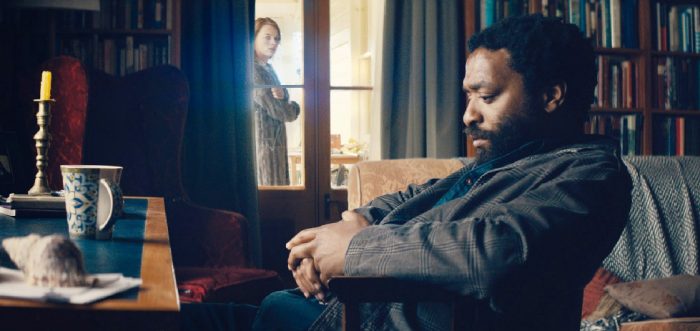
The sales pitch for Z for Zachariah hops onto that increasingly popular apocalyptic bandwagon popularised by the likes of The Walking Dead. Although there’s no shambling corpses to deal with, the world has instead gone to the dogs through a radioactive fallout that continues to poison what are otherwise majestic looking lands (in reality, the outskirts of Christchurch). Our protagonist is Anne (Margot Robbie), a scruffy farmer’s daughter who roams the outside world with a makeshift air helmet on her head and beeping timers to tell her when to go home to her pet dog. Her father is deceased, but the area bequeathed to her continues to provide a natural buffer zone to dwell and grow food in. so she rummages for books in the irradiated library and holds quiet vigils by playing the organ in a tiny church. She is returning home one day when another human emerges from his protective shell, an engineer named John (Chiwetel Ejiofor) who falls desperately ill. Nursing him back to health with his handy cures, he soon finds his own ways to enrich her life, from getting tractor fuel to cracking open the leftover alcohol. As they broach the romantic possibility between them, another sickly man appears by the name of Caleb (Chris Pine), and their various efforts to restart humanity itself (swoon) become an incubator for emotions that threaten to run hot.
In following the welcomely melodramatic thread, the bleak, vacant towns of the outside are left behind for mists and melancholy akin to Wuthering Heights. It’s not nearly as aesthetically tactile as Andrea Arnold’s recent take, nor does it handle its own interracial romance as gracefully, but it’s simple and effective enough to not live or die by comparison to such literary tomes. The plot also has a meandering quality that places it in a precarious position unique to an adaptation; an awkward middle ground between the abstraction of Arnold’s work and the rigourous plot turn check-offs of average literary stagings. I distinctly remember reading the Robert C. O’Brien book on which Zachariah is based in high school, and responding positively to that same rural moodiness. I don’t remember much of anything else, least of all where in the plot the title is invoked, and the film doesn’t quite explain that1 or compensate for its wandering.
It’s no fault of the people onscreen. While her plaid shirts and dirt smears don’t quite sell her as an adolescent, Robbie very ably avoids coquettishness in a role that might elicit as much from a less talented actor, especially as the costume department chooses increasingly trendy outfits for her. Scenes between Anne and John capture the specific vulnerability of a teen caught not knowing what she doesn’t know against a man who, while more experienced, keeps secrets beneath layers of emotional scar tissue, as embodied by Ejiofor in his doughty fashion. Pine proves the perfect catalyst for both of them by being ironically droll and courteous with slinky Southern mannerisms, and he perfectly pitches his more revealing moments in, surprisingly, the best performance of the three. Such straightforward character psychologies are already a huge step up from Zobel’s 2012 debut Compliance, a film which also finds strong performances but fails to dredge up confounding psychological behaviours without necessitating an explanation, and also suffers a compulsion to broach the zeitgeist while this relaxes into more customary methods of characterisation.
Zobel’s greatest ally is returning editor Jane Rizzo, who shows remarkable control in skipping through the linear timeline and through the extended interactions between the three. The highlight is a night of drunken revelry, where acts of intially careless abandon like dancing in the living room or going for a dip in the lake slowly take on a more vulnerable dynamic. With Zobel having walked the line between spontaneity and story weight, Rizzo steps in and times it with utter precision for us to soak in the hidden revelations. She finds a Biblical quality within mundanity within post-apocalyptic grit, which is remarkably appropriate given the big role that the characters’ spiritualities play in their bonds and conflicts. Compliance composer Heather McIntosh also returns with folk-string stylings that are applied far less haphazardly then her debut, completing a team that may yet come to make something more genuinely incendiary than their first outing.
For all of these strengths, Zobel and company can’t save the whiff of an ending in Nissar Modi’s script, which ends the entanglements in a manner too ambiguous to emotionally resonate nor justify its heavy deviation from the original text. Such mismanaged conclusions aren’t uncommon for modern sci-fi, though, and having struck a boldly traditional tone beforehand, it’s a wrapper on an especially well managed story that’s worth dipping into.
